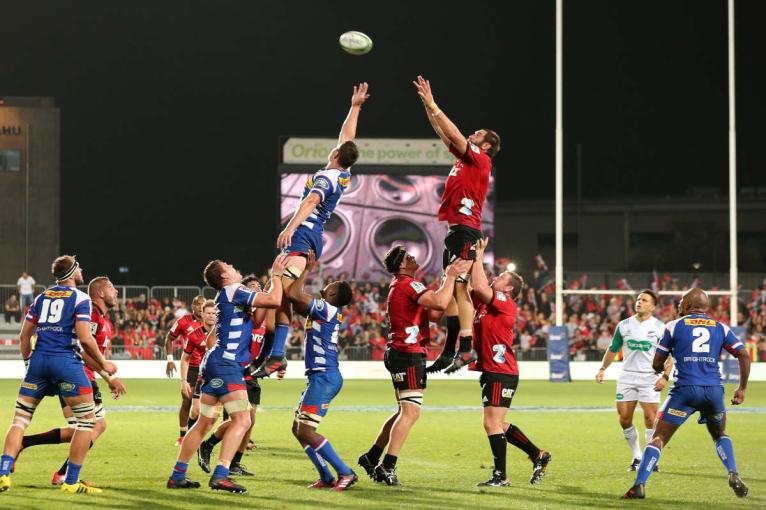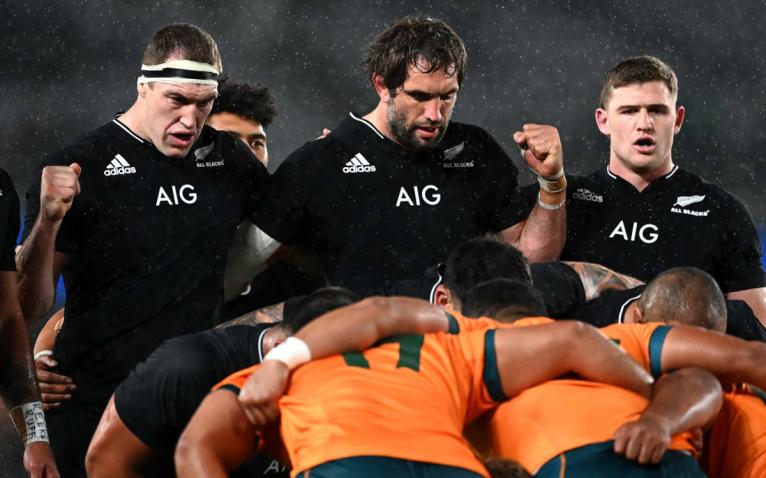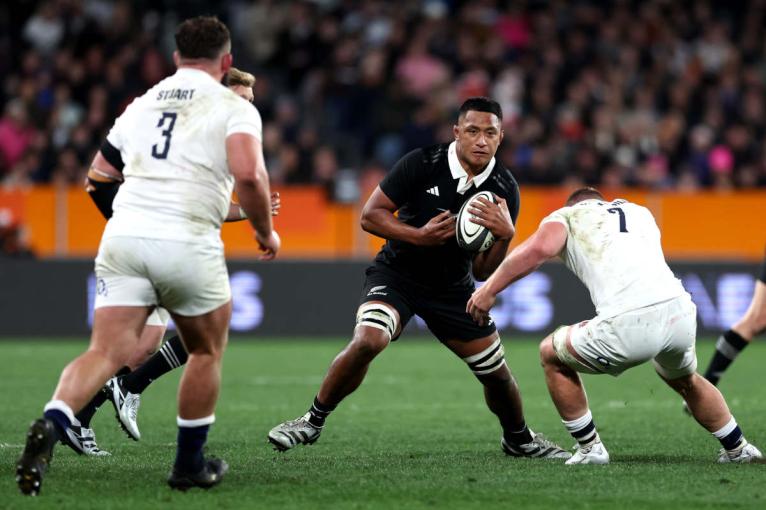There’s a data set beginning to emerge in the wake of the Covid-induced Super Rugby split that says the All Blacks are struggling to adjust to life in their South Seas bubble.
Breaking up Super Rugby and sending the South Africans provinces into the arms of the United Rugby Championship has hurt New Zealand more than anyone imagined.
The numbers tell quite the story. Between 2016 and 2019, when Super Rugby included South African teams as well as the Jaguares from Argentina, the All Blacks won 87 per cent of their tests.
The different styles of rugby that New Zealand’s players were exposed and the different size and shapes of the various athletes with whom they had to battle, built a level of technical craft in all the collision aspects of the game.
In this same period, the All Blacks played the Springboks eight times and beat them on six occasions, drawing once and losing a sole fixture in 2018, and Super Rugby may have had innumerable faults back then with lop-sided scheduling and ridiculously burdensome travel requirements, but it was undoubtedly preparing New Zealand’s players to thrive in the test arena against all-comers.

Since 2021 – time in which Super Rugby has been rescoped into a Pacific competition featuring only teams from New Zealand, Australia, Fiji and by extension Tonga and Samoa funnelled into Moana Pasifika – the All Blacks have a win ratio of 69 per cent.
They have played South Africa eight times in this period and only won three, while their record against Ireland, the next best and most physical side on the planet, the All Blacks have only won once in four games.
They haven’t beaten France on the two occasions they have played them since Super Rugby split, and there is no question that the All Blacks are battling now in a way they weren’t in the last few years before the pandemic changed the world.
For much of the last cycle, the New Zealand media and public believed former All Blacks head coach Ian Foster was the central problem in the declining form of the national team.
But six tests into the Scott Robertson coaching era and his results look much the same as Foster’s – the All Blacks are on a 66 per cent win ratio on his watch – and the same underlying problem is as prevalent now as it was throughout the last cycle.
The All Blacks remain supremely well-equipped to beat the likes of Australia, Scotland, Wales and (usually) Argentina, but when they encounter teams such as South Africa, Ireland, France and England, who have ample power athletes and play an anaerobic style of rugby, they have been found wanting.
What is now undeniable following the South Africa’s 31-27 victory at Ellis Park, is that the All Blacks have a power problem – as in they lack it.
It’s not a glaring deficiency as such, but the loss in Johannesburg was yet another example of the All Blacks being exposed as lacking the collective skill-sets, technical proficiency and sheer size to cope with the collision and breakdown power of the best teams.
The All Blacks remain supremely well-equipped to beat the likes of Australia, Scotland, Wales and (usually) Argentina, but when they encounter teams such as South Africa, Ireland, France and England, who have ample power athletes and play an anaerobic style of rugby, they have too often been found wanting.
This was the case in the Foster era – he eventually found a way to power up his side in 2023 by using his three lock rotation system involving Scott Barrett, Sam Whitelock and Brodie Retallick, by getting the best out of the 1.96m, 115kg Shannon Frizell on the blindside and utilising the post contact running power of hooker Samisoni Taukei’aho.

By the latter rounds of the World Cup, the All Blacks were able to at least stand up to the raw power of the Springboks, but it took the better part of two years for them to get to that point, and now that Whitelock and Retallick have retired, Frizell is in Japan and Taukei’aho is injured, they have regressed on the physical front.
The final quarter of the test at Ellis Park made depressingly familiar viewing for All Blacks fans.
The All Blacks were in the contest up until the last 15 minutes, and for 65 minutes they had shown that they had the higher individual skill-sets, greater awareness about how to create and exploit space and a natural ability to use the ball.
But once the Springboks had their bomb squad on and the All Blacks had to empty their bench to respond, the game changed entirely.
Suddenly the All Blacks couldn’t stop the Springboks rolling maul. They couldn’t shift the jacklers at the breakdown, couldn’t knock the big South African ball carriers back or cope with the sheer physical onslaught to which they were subjected.
Super Rugby was once a rich tapestry of styles and athletes, but now it is a mostly aerobic, ball-in-hand, speed game where all 12 teams, with the exception maybe of the Blues, play a similar style.
South Africa simply powered their way to two tries because the All Blacks couldn’t stop them legally, so they infringed and fell into a repeat cycle where the Boks would win a penalty, maul, win a penalty, maul and so on.
As Robertson said to explain what went wrong: “It’s obviously the discipline stuff, a bit of kick battle, small moments and the game changed just a little bit of momentum.
“Then off the back of that with a bit of discipline, all those things combined, really.”
The style of rugby the All Blacks encountered in South Africa looked nothing like anything on offer in Super Rugby.
The size and body shapes of the Springboks were nothing like the size and body shapes they encounter in Super Rugby and herein lies the problem.
Super Rugby was once a rich tapestry of styles and athletes, but now it is a mostly aerobic, ball-in-hand, speed game where all 12 teams, with the exception maybe of the Blues, play a similar style.
Intercept by Jordie Barrett 🔥#RSAvNZL #AllBlacks pic.twitter.com/kRO9YOQsSw
— All Blacks (@AllBlacks) August 31, 2024
It’s not a bad brand of rugby by any means, but it does create a massive culture shock when the All Blacks get to South Africa or Europe and encounter a different level of power in the collision and different appetite for the set-piece.
Again, as Robertson said before heading to South Africa for the Rugby Championship: “It’s a different challenge. They are set-piece orientated but they can get you into a great kick battle and pressure you in different ways it is a little bit different to Lautoka or playing at Suncorp.
“There is the conditions and all the other factors that come with it.”
One of Super Rugby’s weaknesses most specifically manifested in the All Blacks back-row selection as they effectively picked three opensides at Ellis Park – Ethan Blackadder, Sam Cane and Ardie Savea.
The All Blacks don’t have an athlete the size and shape of Pieter-Steph du Toit, with the athleticism and mobility to flit so easily between the second row and back row.
There’s some truth to the argument that this was strategic – a decision to pick a trio who could support the All Blacks’ intent to play a high-tempo game to run the bigger South Africans about, but there is a stronger case to be made that this combination was picked in the absence of more compelling alternative options.
One of the great failings of the current set-up in New Zealand is that it is producing a generic cohort of loose forwards who are all physically similar and designed to play a similar style of fast, transition rugby.
The All Blacks don’t have an athlete the size and shape of Pieter-Steph du Toit, with the athleticism and mobility to flit so easily between the second row and back row.
They have previously used Scott Barrett on the blindside, but their current lack of options at lock don’t make that a viable option, and this is partly why the selectors are keen to cultivate and develop the 1.95m, 114kg Samipeni Finau at No 6.

Finau is a different body shape entirely to the rest of the loose forwards in the All Blacks squad and equipped with genuinely explosive power, but he’s struggled to take his Super Rugby form into the test arena.
The All Blacks will be able to fix some of their power issues this year when Blues captain Patrick Tuipulotu and Highlanders captain Ethan de Groot return from injury, and will be helped again when Taukei’aho returns from his ripped Achilles next year, and potentially, Shannon Frizell could return from Japan.
But learning the dark arts and building the requisite skills and abilities to cope with the bigger, anaerobic athletes dominating the world game will remain the primary challenge for the All Blacks throughout this World Cup cycle, because Super Rugby is no longer doing that for them.


PSDT is an "anaerobic" player?
Yep - that makes sense. He's always standing around, waiting for the next set piece, instead of running, carrying, tackling, and hitting rucks.
PSDT only executed 28 tackles against the ABs in the RWC final, as compared to the peerless McCaw, whose 18 tackles in an RWC final was the previous record.
Duh ...
I thought anaerobic player means he holds his breath a lot during the game? Obviously because he’s always poop-scared of the other team?
SANZAR Super Rugby Titles Won 1996-2019 ...NZRU:17, ARU:4, SARU:3.. NZ francises having a 71% winning sucess rate before SARU went to PRO14 now the URC... Go the AB's...changing up their teamwork impact for DHL Stadium..and needing to be a bit smarter in keeping the match officials happy...
Paranara is the oppositions dream.
Must be edging closer to 100% winning success rate which I guess is the point of the article.
Not playing at Newlands. Cape Town Stadium.
Keeping the match officials happy? I assume you mean happier given the maul try and overlooked headbutt?
The data set also shows that SA enjoyed their best results during the time in Super Rugby. Both before and after results have not been so good. Small data set mind you.
Wrong again. Please check facts before making definitive statements. SA have an 85.7% win ratio in 2024 - the highest since setting the record of 92% and 17 consecutive wins under Nic Mallett which incidentally featured none other than Rassie at No8.
The main impact of SA switching to NH rugby is the referees. SA are getting the benefit of NH referees as they are used to playing under that style of refereeing. The last three test matches have all been slow games with lots of ruck penalties against NZ and many rolling mauls. Twice Ardie Savea has been penalised when clearly winning the ball that clearly is beyond the comprehension of a NH referee. And it will likely be the same again this weekend.
Perhaps this is the reason and the payoff behind the switch to the NH by SA rugby.
The could of course use Australian referees but after the NIc Berry assassination by Rassie they are probably reluctant to except the job. Rassie does know what he's doing, even his meltdowns are calculated.
You should watch the replay. Twice the ref warned Savea - let it go the ruck has been formed but Savea just kept on cpontestyiong the ball on the ground with his hands in a ruck. You are right though Savea is used to playing under SH refs who prize flow above the rules. If you want to play a hybrid between basketball and league then take out ruck maul scrum and lineout. If you want to play union learn the rules and listen to the ref.
I highly doubt the reason for swinging to the north was because of referees.
You’re overlooking the fact that the boks have invested in getting better at playing within the laws. The ABs should invest in a laws coach. Their attitude to this, however, has come off as they don’t care.
Which would explain why the ABs probably had the most cards of all the tier 1s last year. You could plan to play them 15 on 14. Foster even simulated that in the semi against Argentina. Opting to keep the team on 14 after Barret’s sin bin was up.
A few points to disagree as it is already captured in reply elsewhere in this post: Savea is to be blamed for the AB's penalties. It's not the first time that the AB's have a NH ref. Again, this was one of the faster AB games, right from the start. Check the Octa stats to verify this, so no hope to pin advantage on SA because of -inter alia- slow refs and/or play. AB's lost their nous on how to clean out effectively and legally, wheter under a NH of SH ref. Jaco Peyper, ex 1st tier ref, now a consultant at the Boks (again a masterpiece from a pinch of Rassies' mind) is the kingpin in assisting the Boks how to do it better. Then the Tony Brown inclusion; what he did with the Boks' backline in a small period of time, is astonishing (and he's an AB insider!). Roll on Test rugby!
He clearly told Savea on two occasions that the ruck had formed before blowing, but either Ardie didn't hear him or thought he could get away with it.
Thought the game on Sunday was incredibly quick relative to most internationals?
I think the breakdown is where we are missing a trick, not cleaning quickly enough and/or handling counter rucking...we prioritise quick ruck ball in NZ which often results in the defence not committing if they're slightly late. It's a much bigger part of the game in NH.
Benefit? Not the term I would use lol!
Exactly right though. I don't subscribe to the cheating allegations, I even veer away from there being bias. I just think the NH refs are a bit slow in adjusting in the way they have in SR. It will get there though. It was very unusual to see the imbalance in say the way he 'played on' at scrum time when the ball was free, to when he would blow the whistle when some inconsequential maul or ruck infraction happened.
Kiwis obsession with undermining Australia at every opportunity has come back to bite them.
Karma is like that bro.
Haha hows that john?
Both your SAn type teams, the Brumbies and Reds, have been run by Australians. How is it NZ's fault that they haven't been up at this imagined SAn level?
If your super rugby teams weren't so soft bellied, we wouldn't be in this mess
Bollocks headline. Following on from possibly the greatest AB team ever in 2015 declined a bit then had a crap head coach 2019-23, have lost some truly great ABs post RWC and now a youngish team is adapting to new coaches, mentality and systems. Give it a year and I like to think that we will again be competing with everyone else week in week out.
Yes the article itself had the right mix of reasons. From the powerful days, I can only think of two positions were they don't have that size anymore. Kaino's blindside spot and Ma'a Nonu's 12 jerseys are the only difference from then till now.
Far more so for me it is the technical aspect the All Blacks are lacking. I watched the first half of 2021's ABvPuma match yesterday I saw Reiko popping the ball beautifully to his support a couple of times then jinking and stepping through a gap the other. These are two aspects to his game we have not seen in over 12 months! Sotutu had try involvements through skill and deft linking with others in all the first have try's. The days of rugby nous from a Nuno, Smith, Smith blackline, or a Read, Savea, Coles wide pod, days are just not their. Too much changed towards size I'm afraid.
The ABs benefited from a silly pass that led to Barretts interception try. Take that easy 7 pointer out and with the exception of 1 brilliant try the ABs would have lost by more than 10.
Crown has well slipped.
That wasn't an easy 7 point RW, they had to work hard for that. They had been up and confrontational to Kolisi the two previous times they ran that play in the game, and by that point, they were all just a bit more disjointed by it. It wasn't just 1 bad pass.
That said, SA basically had a few errors that paved the way to all the ABs points. Sure, they Abs have always been lethal on the counterattack, but all their points? The game will be in SA's hands again I'm afraid.
We had a bonus point after 50mins and then bottled the final quarter.
Don't stop at rubbing out one try. Remove all four if you want to give sth Africa a dominant victory. Add a couple of drop kicks from inside their 22 and it's a total humiliation. 50-0. What a result.
Too much credit is being given to SR not being the kind of competition the AB's need and not providing a genuine pathway in the absence of the SA sides. Sure this is a factor but isnt the only reason why.
What the author conveniently ignores is that the problem dates back from well before 2020.
Honestly, between the Brodie/Whitelock generation and 2019 how many big world class forwards came through our system? Blackadder, Scooter, Papalii and Ardie aren't that big, Lomax was in Australia.
At least there are bigger players like Tamaiti, Posi, Darry, Lord, Holland and Finau coming through now, let's see how they go once they have fifteen tests under their belts.
They will improve with test match experience, but so will the other top teams with their new players coming in.
This is the same Gregor Paul who wrote pages and pages of reasons why playing against SA teams in Super Rugby was of no value to AB rugby. This was back in 2019 either before or at the start of the RWC.
Was he on the juice back then when he wrote his words or did he conveniently forget that it was he that was the main media boy calling for a new trans Tasman competition.l excluding SA teams.
Well Gregor, make up your mind and don’t change it once a year like you change your socks.
He sounds even more on the juice now!
That article was about Andrew Merhtens comments (judging from the google blurb)
I found it. Google this clown show article
Gregor Paul: Why Super Rugby must ditch South Africa
By Gregor Paul
Reporter·NZ Herald·
29 Nov, 2019
The better rugby is played in NH leagues now. The innovation is happenning there too at International level. In Europe you have to be able to beat a Leinster, Toulouse, LaRochelle, Northhampton, Bordeax etc to win a European Cup. I think Super Rugby teams would face a big shock. South Africa teams are now playing these outfits week in week out making their way up to challenge at these high levels. Stronger teams/squads will start travelling to SA too.
Describe better? I would have thought innovation would have already been in that description.
It doesn't matter who the teams are Terry, someone has to win. As Euro has shown, it's someone different every time. Not the best?
I do like a Euro comp where those SA games are more important, some sort of model were you forfeit too much be sending a low strength team (but also needs to be player friendly approach).
I still think these teams would have a hard time against the Blues & Chiefs, maybe Crusaders once they get their act sorted out.
Agreed. I enjoy the variety in playing styles and philosophies. I like the variety in teams and players. Its interesting and never boring for the players and fans.
If the absence of the South Africans from super rugby is the only explanation for the ABs apparent decline, then this is just the start… I’m sure it’s a factor, but I’m not sure it’s the whole story…
Kiwi click bait writers never acknowledge that NH teams and players have improved dramatically especially over the past 10 years.